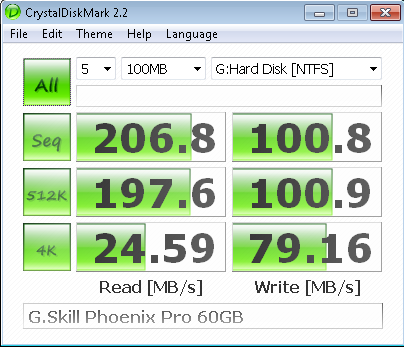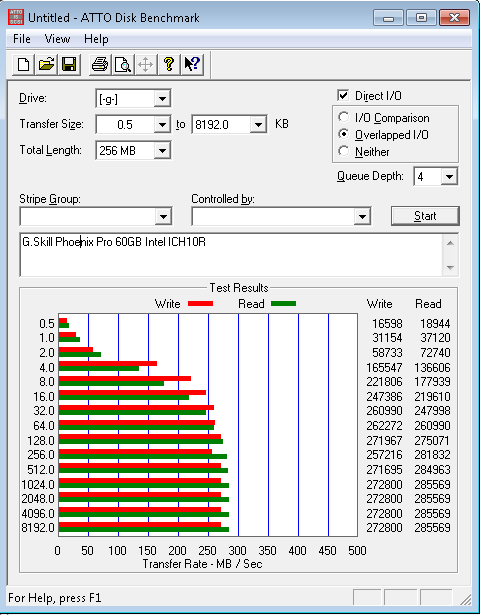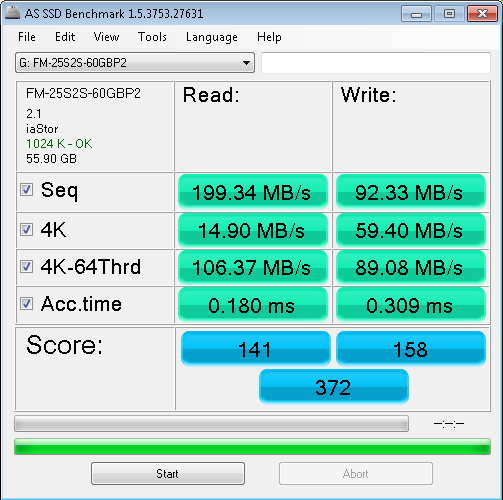Today I am taking a look at the G.Skill Phoenix Pro 60GB Sandforce SFF-1222 based SSD. Two things that should be clarified at the outset are that the G.Skill Phoenix Pro 60GB and the ADATA S599 64GB both have the same formatted capacity (55.8GBs) and that there is no perceivable real-world difference between the drives. The difference between the 60GB and 64GB drives is due to marketing semantics rather than physical differences. Second, I have used both drives quite a bit over the past few weeks, and I use Indilinx and Intel X25-M G2 drives regularly as well both in servers and on all notebooks and desktops. Frankly, each controller exhibits different characteristics that one can see easily using a suite of benchmarking software. Those benchmark differences are not translating to real-world performance advantages for one controller over another at this point.Like the ADATA S599 64GB, the G.Skill Phoenix Pro’s retail package comes with a 2.5″ to 3.5″ converter (G.Skill’s is black). For those that need one, this is a nice bonus for a SSD that costs just over $100.
Test Configuration
For the test configuration I used the same setup as I have been using for my SSD reviews:
- CPU: Intel Core i7 920
- Motherboard: Gigabyte X58-Extreme
- Memory: 12GB of Corsair Dominator GT 1600 C7 DDR3
- Case: CoolerMaster Cosmos S
- Drives (OS): 2x OCZ Vertex 120GB in RAID 0
- SSDs: OCZ Agility 2 120GB and ADATA S599 64GB and G.Skill Phoenix Pro 60GB
- Controller: Intel ICH10R with Intel Rapid Storage Technology (RST) 9.6.0.1014
- NIC (additional): Intel Pro/1000 PT Quad
- Host OS: Microsoft Windows 7 Ultimate 64-bit
I will again note that the numbers I find in my testing may not be indicative of what one may see on an AMD or NVIDIA chipset. In fact, I tried installing the drive on a default ICH10R and Windows 7 x64 Pro installation using all default drivers and saw significantly lower performance. Furthermore, I tried an eSATA port on my laptop an again saw poor performance. If installing any SSD, I would strongly suggest installing the newest Intel RST drivers and making sure the SATA controller is set to AHCI or RAID mode.
G.Skill Phoenix Pro 60GB Benchmarks
On to the benchmarks! I am using my revised standard benchmark suite to make it easy to compare to other SSD reviews I have posted.
CrystalDiskMark
I have used CrystalDiskMark (and an older one at that at version 2.2) for quite a while now, and so I am providing these results as a point of reference.

I will not linger on the CrystalDiskMark scores as they look very similar to the ADATA S599 64GB scores.
ATTO Benchmark
ATTO has been one of my longstanding favorite benchmarks as it usually gives a different view of drive performance than a lot of the other quick benchmarks available.

This is how Sandforce drive manufacturers claim 285MB/s read 275MB/s write speeds. The ATTO benchmark basically uses highly compressible data to stream to the disk. Since Sandforce controllers compress data before writing it to flash, this is basically a best case benchmark. I will note though that every Sandforce drive I have seen in the 120GB and 60GB capacities have managed the advertised read/write speeds. The badness is that those advertised figures are really only applicable in synthetic tests, or more specifically, A synthetic test (ATTO). Compared to the ADATA S599 64GB scores, there is not much difference here.
AS ASSD Benchmark
The AS ASSD Benchmark was developed specifically to test SSDs. This is a new benchmark to my suite that I started to use in the Intel X25-V 40GB RAID 0 benchmarks and used again with the OCZ Agility 2 benchmarks.

Needless to say, these are some pretty solid numbers. Next generation drives will likely be significantly better, but at the same time, for $100-150 a 60GB drive today makes quite a bit of sense.
Conclusion
The G.Skill Phoenix Pro 60GB performs very similarly to the ADATA S599 64GB and likewise performs fairly similarly to the OCZ Agility 2 120GB 120GB. Again, I do not think many people will notice a difference but people need to be aware that the quoted 285/275MB/s reads/ writes are not a consistently achievable measure in the real world. For people that do a lot of benchmarking, the G.Skill Phoenix Pro may be the better of the two drives. With all of that being said, for someone looking for a ZFS L2ARC drive, buying 60GB models look attractive in many cases over larger versions.
My overall conclusion now owning over a dozen Sandforce based drives is that purchasing decisions between the different vendors should be based on:
- Purchase Price
- Included bracket (if required)
- Warranty term and company offering it
- Requirement for higher IOP firmware
G.Skill’s Phoenix Pro is generally less expensive than the similar capacity Vertex 2 which can make it a decent value at times unless someone has a warranty preference for G.Skill or OCZ. Sadly, the differentiation in the consumer SSD market is relatively low at this point. On the plus side, that is forcing manufacturers to compete on price which is good for consumers.



